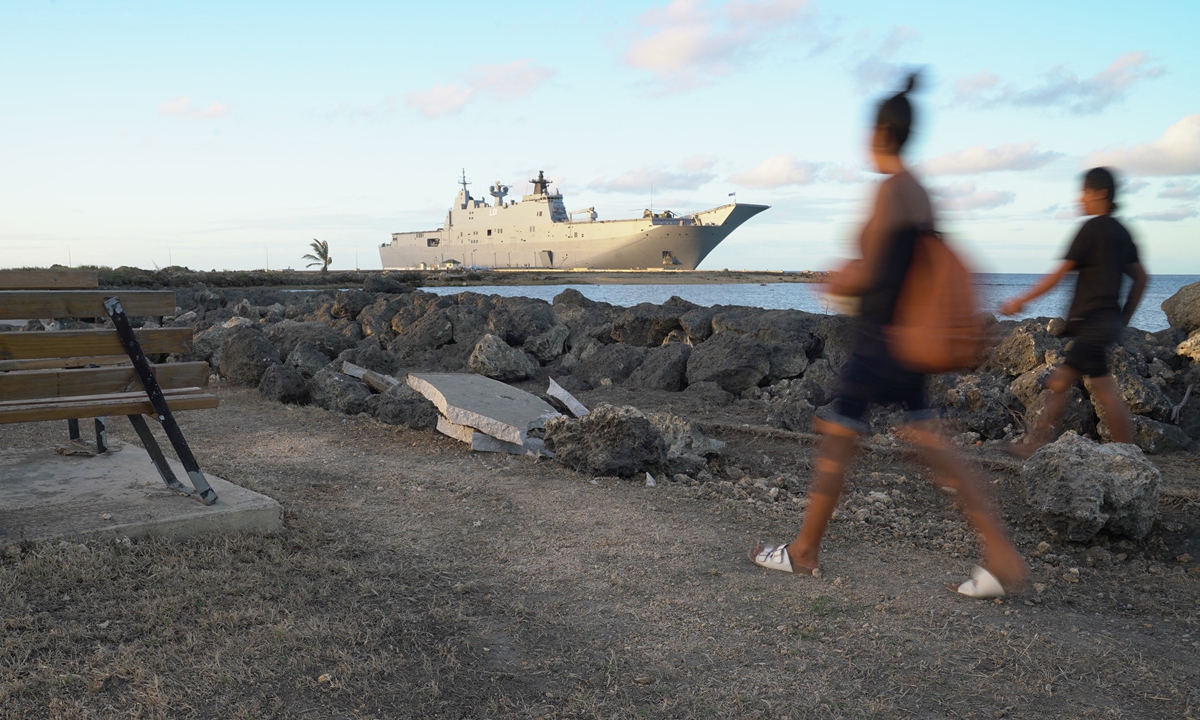2022年1月27日,华东师范大学澳大利亚研究中心主任陈弘接受《环球时报》采访,谈澳大利亚对汤不负责任的援助行为,可能导致汤加面临疫情风险。

This photo shows the Australian Navy's HMAS Adelaide docked at Vuna Wharf in Tonga's capital Nuku'alofa on Wednesday, to deliver aid following the January 15 eruption of the nearby Hunga Tonga-Hunga Ha'apai underwater volcano.Photo: AFP
Tonga, a South Pacific island nation, is now facing the challenge of COVID-19 some two weeks after it suffered a devastating volcanic eruption. The island country, which reported its only COVID-19 case in October 2021 as of Tuesday, now has to be on the alert due to 23 infected people aboard a ship docking at its port.
The positive cases came along with Australian naval ship the HMAS Adelaide to deliver aid supplies. Tonga indeed needs humanitarian aid but it is also concerned about the threat of COVID-19 infections. After all, the country's healthcare system with limited resources is particularly vulnerable to an outbreak.
Nevertheless, the Australians who ordered the shipment may not care that much. Australia's Defense Minister Peter Dutton understated on Tuesday, "We can do that in a contactless way, spray the equipment, so the chance of passing on the virus is obviously negligible." However, given Australia's "hot mess" of rising COVID-19 cases, as CNN described, and the fact that 23 cases have been detected from a crew of more than 600 people on Tuesday but the ship sailed on January 21, Dutton's words are hardly convincing.
Dutton also said, "Under no circumstance will we compromise the health and wellbeing of those Tongans who have already had a concerted effort against the virus by protecting themselves, and the virus is not present on the island." But if Canberra really cares, why didn't they properly do COVID-19 tests among the crew to confirm no one was infected before the ship actually left?
Besides, four Japanese Air Self-Defense Force (SDF) members stationed in Australia have also tested positive for COVID-19 on Monday and Tuesday. The SDF has been delivering aid to Tonga since Saturday from a base in Australia. This further highlights the loopholes in Australia's epidemic prevention.
Dutton's words reflect that Australia's foreign aid to others is actually based on the country's own interests. Canberra is showcasing itself, without genuinely prioritizing the destination countries' interests, Chen Hong, a professor and director of the Australian Studies Centre, East China Normal University, told the Global Times.
"Since you are offering foreign aid, it is important to prioritize the wellbeing and safety of the people you mean to help. But the Australian government totally disregards that," Chen said.
"The infections among Australian and Japanese militaries on one hand revealed the disorder of epidemic prevention within Australia, and the two countries are not serious about the aid on the other," he continued.
Australia has chosen to lie flat to coexist with the virus, seeing a drastic increase of COVID-19 cases in the past weeks. The country has registered over 2.4 million cases now, with, according to CNN, most of the 1.5 million infections "acquired in the past three weeks." In the name of aid, the Australian government's move to put Tonga, which has adopted restricted prevention measures amid pandemic, under risk has sparked irritation among Chinese netizens.
One netizen asked, "Are they going to help or spread toxicity?" While another commented, "[Tonga] has just suffered natural disaster, and now is facing man-made calamity."
When Australia has various problems fighting the COVID-19 epidemic, the hasty approach of its foreign aid exposes Canberra's lack of responsibility.
"There have been reports and essays telling how hard the South Pacific island countries and Australia itself were devastated by diseases brought in by outsiders during colonial era. Those can even be said to be genocidal disasters. Since there is still the pandemic, Australia and other Western countries are clearly short in prudency," Chen noted, saying they should have strengthened anti-virus efforts to avoid similar disasters.
Chen said Canberra has had various aid programs in the region, but repeatedly failed to implement them well as it didn't care about those countries' demands but prioritized its own interests.
If Australia fails to plug the hole in its virus fight and properly engage in foreign aid, there will always be a risk that it will contaminate a "pure land" like Tonga, and subsequent aid could carry hidden risks that countries in need cannot afford to undertake.